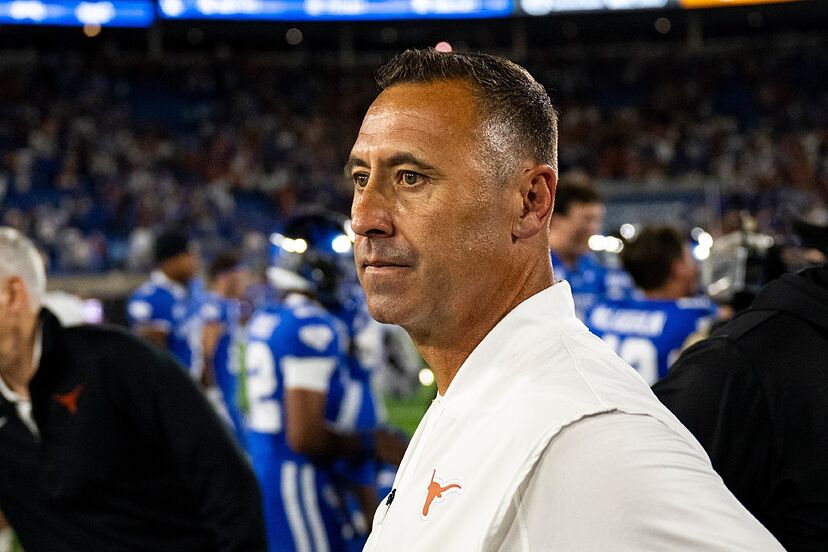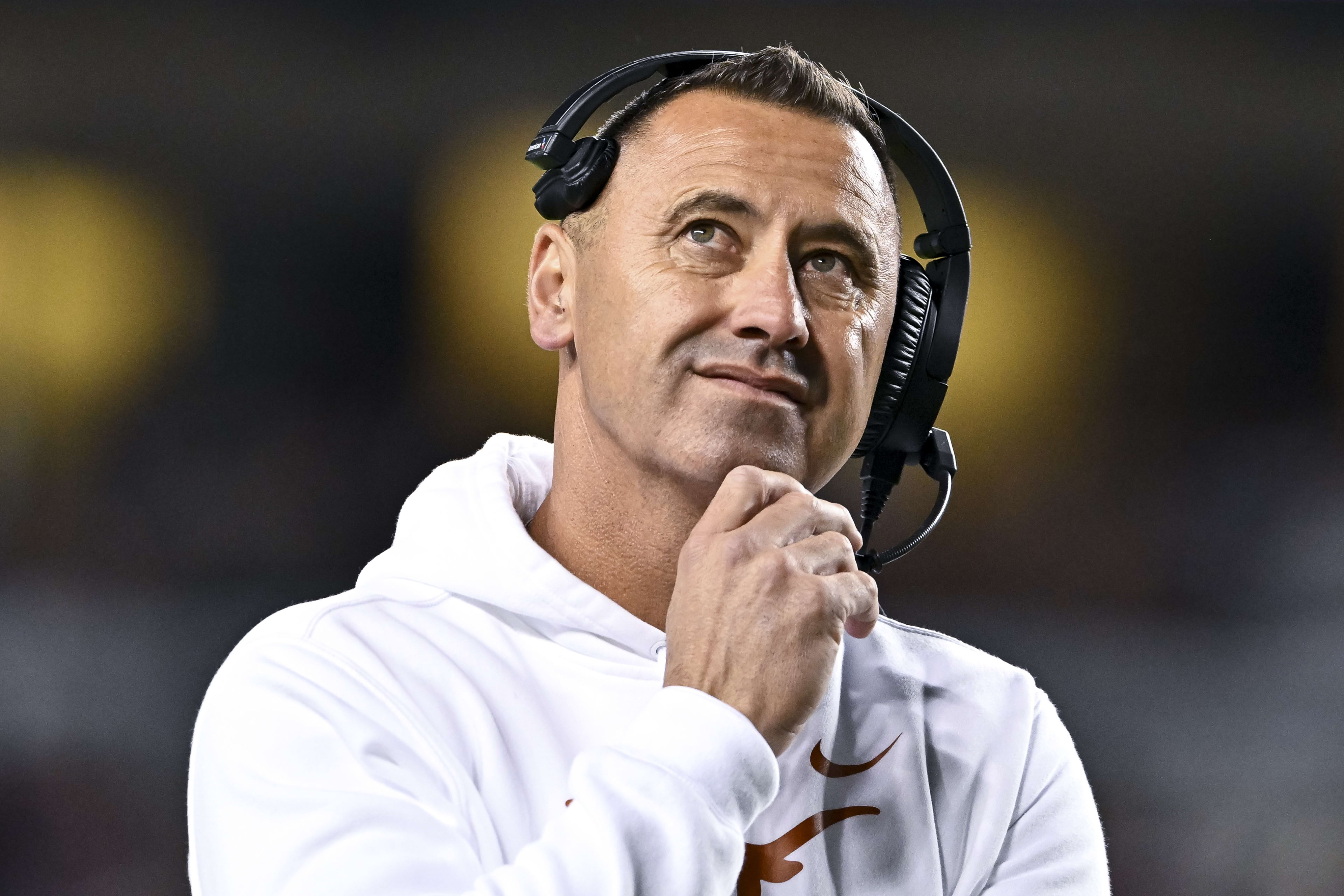Texas Turmoil: Should Steve Sarkisian Give Up His Play-Calling Duties? Inside the Pressure Cooker Rocking Longhorn Nation
A storm is brewing deep in the heart of Texas. Not the kind that rolls across the plains — but one that’s shaking the foundation of the Texas Longhorns football program.
The question that has consumed message boards, talk shows, and alumni dinners alike:
Should head coach Steve Sarkisian give up his play-calling duties?
It’s a debate that’s dividing the fanbase, fueling media fire, and — depending on how this season ends — could define Sarkisian’s legacy in Austin.
⚡ The Growing Tension in Longhorn Nation
For weeks now, the murmurs have turned into roars. Texas’ once-explosive offense — a machine that averaged over 34 points per game under Sarkisian since his arrival — suddenly looks lost. Drives stall. Red-zone opportunities vanish. Confidence seems shaken.
After back-to-back sluggish performances, even diehard supporters are beginning to wonder: Has Sark lost his edge?
What started as a simple question of “what’s wrong with the offense?” has spiraled into a full-blown identity crisis. Some fans demand immediate change, calling for Sarkisian to hand over play-calling to offensive coordinator Kyle Flood or quarterbacks coach AJ Milwee. Others argue that stripping Sark of his play sheet would be like asking Picasso to stop painting.
For now, the coach himself isn’t flinching.
“No,” Sarkisian said firmly when asked if he’d consider delegating play-calling. “That’s what I do. That’s who I am.”
But in Austin, confidence doesn’t silence speculation — it amplifies it.
🎯 Why Sarkisian Should Keep Calling Plays
Let’s start with the obvious: Steve Sarkisian is one of the best offensive minds in college football.
His resume speaks for itself. As Alabama’s offensive coordinator in 2020, he orchestrated one of the most dominant units in college football history, averaging 48.5 points per game and producing a Heisman Trophy winner in DeVonta Smith.
At Texas, Sarkisian’s offense revitalized a program starved for excitement. In 2023, the Longhorns averaged over 35 points per game, upset Alabama in Tuscaloosa, and looked like a legitimate national contender.
His system — a blend of pro-style concepts and high-tempo rhythm — has consistently produced NFL-ready talent. Players trust him. Quarterbacks thrive under him.
“Sark’s play-calling is what brought me here,” said one offensive starter privately. “He sees the game differently. He plays chess when everyone else is playing checkers.”
Those who know Sarkisian best argue that the offensive slump isn’t about the plays — it’s about execution.
Injuries, inconsistent quarterback play, and a struggling offensive line have all contributed to the frustration. Critics forget that even the best play calls fall flat when protection breaks down or receivers drop critical passes.
Moreover, removing Sark from play-calling could fracture the rhythm of the coaching staff midseason — a dangerous gamble with the SEC transition looming.
“You don’t take the keys away from your best driver because of one bad lap,” said one former Texas assistant. “You fix the car. You don’t bench the driver.”
🚨 The Case for Giving Up Control
And yet… there’s another side to this.
Because for all of Sarkisian’s brilliance, the pressure in Austin isn’t like anywhere else in America. At Texas, expectations aren’t goals — they’re demands.
The Longhorns don’t want moral victories or philosophical explanations. They want points, wins, and playoff appearances.
And lately, the numbers don’t lie.
Texas ranks near the bottom of the Big 12 in third-down conversion rate. Red-zone efficiency has cratered. In their last two games, the offense has managed just two touchdowns in eight quarters.
It’s not just inefficiency — it’s predictability. Opposing defenses seem to know what’s coming. Analysts have pointed out that Texas often runs the same motion packages without variation, making it easier to anticipate Sark’s calls.
Even former players have voiced frustration.
“At some point, you’ve got to self-scout,” one ex-Texas receiver said anonymously. “He’s doing too much. He’s coaching the team, managing the game, and calling plays. Sometimes that ego costs you clarity.”
Therein lies the heart of the argument. By refusing to delegate, Sarkisian may be overextending himself — sacrificing the broader responsibilities of head coaching for the micro-control of every down.
Great leaders know when to trust their lieutenants. And maybe, just maybe, it’s time for Sark to trust his.

💥 The Locker Room Dynamic
Inside the locker room, the players remain publicly loyal — but privately, there’s tension.
Some offensive players reportedly feel frustrated by the lack of adjustments. They believe Sarkisian is too slow to adapt mid-game when defenses throw new looks. Others defend him, insisting that he’s teaching them accountability through adversity.
“Coach Sark doesn’t panic,” said one offensive lineman. “He always says, ‘Stick to the plan, execute better.’”
But as the whispers grow louder outside the locker room, maintaining unity inside it becomes harder. Every incompletion now feels like a referendum on Sarkisian’s control. Every stalled drive feeds the narrative that he’s too stubborn to evolve.
It’s a dangerous place for any program to be — especially one trying to prove it belongs among college football’s elite again.
🔥 The Bigger Picture — and the Risk
If Texas finishes strong, this conversation will disappear overnight. Sarkisian will be hailed for staying true to his vision, silencing critics, and proving that faith in the process pays off.
But if the offense continues to sputter — and the Longhorns drop more winnable games — the debate could turn toxic. Boosters will grow restless. Fans will turn impatient. Media scrutiny will intensify.
And history hasn’t been kind to coaches who cling to control too tightly. Just ask former Texas coach Tom Herman — another offensive mastermind who refused to delegate until it was too late.
For Sarkisian, this isn’t just about play-calling. It’s about trust, adaptability, and the fine line between confidence and arrogance.

⚔️ The Verdict: Sarkisian’s Defining Choice
So, should Steve Sarkisian give up play-calling?
Not yet — but the clock is ticking.
He’s earned the right to steer the ship through rough waters. His track record commands that respect. But if Texas continues to stall offensively over the next few weeks, pride can no longer outweigh pragmatism.
Because at a program like Texas, excuses don’t last. Results do.
The best coaches — Nick Saban, Kirby Smart, Dabo Swinney — all learned the same truth: You can’t do it all forever.
At some point, delegation isn’t weakness. It’s wisdom.
And if Sarkisian wants to turn this season around — and protect his legacy — he may soon have to do the hardest thing for a play-caller to do:
Put down the headset, trust his staff, and prove that leadership is more than calling plays — it’s knowing when to let go.
As the Longhorns prepare for their next game, one question looms larger than the scoreboard:
Will Steve Sarkisian’s greatest strength — his offensive genius — become the very thing that brings him down?
For now, he holds the call sheet tightly in his hand.
But in Austin, even the strongest grip can start to slip when the pressure starts to rise.





